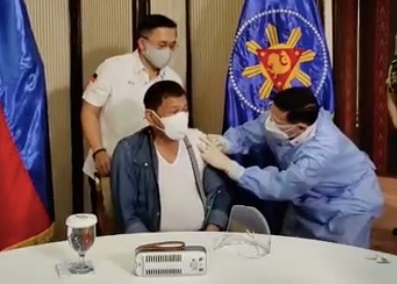Duterte gets Sinopharm shot as Sputnik V rollout starts

Health Secretary Francisco Duque III administers Sinopharm’s COVID-19 vaccine to President Rodrigo Duterte on Monday, May 3, 2021, in Malacañang. (Screenshot from Sen. Bong Go’s Facebook livestream)
MANILA, Philippines — As the rollout of Russia’s Sputnik V vaccine doses in Metro Manila began, President Rodrigo Duterte was inoculated on Monday with China’s Sinopharm vaccine.
It was Health Secretary Francisco Duque III who administered the vaccine to the president, with the event aired live on the Facebook page of Sen. Christopher “Bong” Go.
“I feel good and I have been expecting this shot, vaccination a long time ago,” Duterte said in the video.
He said it took his doctor a long time to make an assessment before recommending that he get Sinopharm, although the Food and Drug Administration (FDA) has yet to grant an emergency use authorization on the vaccine manufactured by China National Pharmaceutical Group Corp.
But the FDA in February granted the Presidential Security Group a compassionate use permit for 10,000 doses of the vaccine.
Article continues after this advertisementIn his press briefing on Monday morning, presidential spokesperson Harry Roque said, “I will ask him (Mr. Duterte) later if he will now consider Sputnik V.”
Article continues after this advertisementThe President had earlier said he preferred to be vaccinated with either a Chinese or Russian vaccine.
Distribution
An initial batch of 15,000 Sputnik V doses that arrived on Saturday was rolled out on Monday in the cities of Makati, Taguig, Muntinlupa, Parañaque, and Manila, which will get 3,000 doses each.
The Department of Health (DOH) went ahead with the rollout, despite the vaccine being banned in Brazil after its health regulator cited risks to persons with low immunity and respiratory problems.
In her press briefing, Health Undersecretary Maria Rosario Vergeire said this was the first time the country would handle ultra-cold vaccines, which require storage at -18ºC. The vaccines used in the country are stored at 2ºC to 8ºC.
“We will draw experience from this initial rollout to prepare for the 485,000 [doses] that will arrive before the end of the month,” Vergeire said.
In a statement, Muntinlupa Mayor Jaime Fresnedi confirmed that his city had received 3,000 doses of the Russian vaccine, as he thanked the national government for that allotment.
The Sputnik V jabs were stored at the Ospital ng Muntinlupa and the Asian Hospital and Medical Center.
‘Evaluated very thoroughly’
The DOH had cautioned against the use of the Sputnik V doses on people 60 years and above, in accordance with the emergency use authorization for the vaccine.
But Dr. Nina Gloriani, head of the Vaccine Expert Panel (VEP) of the Department of Science and Technology, said in Roque’s briefing that “Sputnik V was evaluated by the (VEP) very thoroughly for safety, immunogenicity and efficacy… We asked for a lot of data, and they sent it to us. In fairness, it was the most comprehensive set of documents we received from these vaccine companies.”
The Sputnik V vaccine was developed by Moscow-based Gamaleya Research Institute for Epidemiology and Microbiology.
The DOH also said the vaccine should not be given to pregnant or breastfeeding mothers.
Dr. Lulu Bravo, chair of the National Adverse Events Following Immunization Committee of the DOH, said the committee had advised against giving the Russian vaccine to that particular subgroup, since there was “no sufficient safety data yet for pregnant women.”
Case update
But another member of the VEP, infectious diseases specialist Dr. Rontgene Solante, said in a television interview, “For now, I don’t see any issue with the efficacy and safety of this vaccine. When we did evaluate this based on Phase 1, Phase 2, and the published Phase 3 trial, it passed our evaluation in the VEP and in the FDA.”
The DOH on Monday reported 7,255 new COVID-19 cases, which brought the country’s caseload to 1,062,225.
This was lower than the daily cases recorded last week at around 8,000. The DOH explained this was because 15 testing laboratories did not submit their data on Saturday, an official holiday marking Labor Day.
It also reported 94 more COVID-19 deaths—51 of which were previously declared as recoveries—and this brought the death toll to 17,525.
The DOH posted 9,214 more recoveries, bringing total survivors to 975,234 or 91.8 percent of the total confirmed cases.
The country still has 69,466 active cases, of which 94.7 percent are mild, 1.8 percent asymptomatic, 0.94 percent moderate, 1.4 percent severe and 1.1 percent critical.